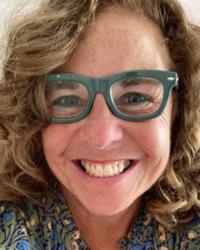When law student Chelsea Liu was in an abusive relationship, she could — and did — pack up her things and flee. But that isn't an option for people trapped at home as a result of the COVID-19 pandemic. Domestic violence victims often have to shelter in place with their abusers, the result of public health orders in Washington.
"I was able to run and cut contact. But in this situation, no one can just run away," she said. "I want to help those who can't get help during the stay-home orders."

Liu and almost a dozen other Seattle University School of Law students have signed up for a new project launched by Professor Deirdre Bowen — a "pop-up clinic" of sorts that addresses the increased need for domestic violence protection orders during the pandemic. Student volunteers, all of whom studied family law with Bowen, will be on call to help victims fill out the required legal forms to obtain a protection order. And all of it will happen online.
The clinic launched on Friday, April 17. No firm end date has been set, but Bowen anticipates that it will continue as a volunteer opportunity for students as long as the increased need is still there.
"The stay-home orders are intended to keep everyone safe, but if you're a victim of domestic violence you're now trapped at home with your abuser," Bowen said, adding that estimates show an increase of 30 to 50 percent in abuse-related calls to police since the pandemic began.
Bowen serves on the board of directors for LegalAtoms.com, a two-year-old Seattle tech company that offers free or low-cost family law services online. Filing for a protection order is free. King County forged a partnership with LegalAtoms.com in early March to host the five required and two optional forms related to protection orders.
Bowen said she had been looking for opportunities to get her family law students involved in the site's access to justice mission, and the emergency conditions created by COVID-19 made it possible.
First, there's an increase in demand. Mir Tariq, CEO of LegalAtoms.com, said traffic to the website is five to 10 times higher than what it was before the pandemic.
Second, King County courts now allow the entire process to happen electronically, in compliance with public health guidelines for social distancing.
The King County Prosecuting Attorney's Office has a Protection Order Advocacy Program, in which advocates walk through the legal petition process with a victim of domestic violence, answering any questions they may have and helping them document their abuse in a way that meets legal criteria for a protection order. Law students participating in the clinic will now be on call to serve as additional advocates during the time of increased need.
The forms are on the LegalAtoms.com website and the questions are handled through the site's embedded chat or video conferencing functions.
Because non-lawyers were already helping with the forms prior to the pandemic, Bowen felt confident that students would be allowed to help as well. But she also recruited licensed, practicing family lawyers to serve as mentors to the students when questions arise that might be considered legal advice.
Hillary Roberts '13, an attorney at McKinley Irvin, is one of those mentors.
"This is a pleadings-driven state. So much of what we do in the realm of domestic violence and family law hinges on what we write and submit before we ever step foot in court," she said. "It's absolutely essential that students learn to listen to the client, learn their stories, and then practice translating the facts in a format the court can understand. Learning to listen and write effectively are foundational skills that will serve these students (and their future clients) exceptionally well in the future."
The forms are reviewed by a King County family court commissioner, who rules on the order. If the protection order is granted, the abuser must then leave the victim's home.
At a time when students might themselves feel anxious about the pandemic, it's reassuring to offer help to others, Bowen said.
"It shows them the power of their law degree," she said. "It helps them and somebody else at the same time."
Student Andrew Perkins agreed, saying that the family law class had prepared him for the work ahead.
"Professor Bowen's passion for the work and attention to detail is inspiring especially because we too are dealing with a great deal of confusion as students and professors during a pandemic," he said. "I am hopeful some of her optimism and desire to help has rubbed off on me here."
